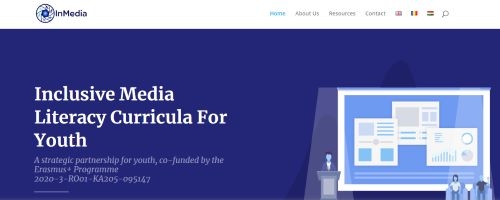back
InMedia: Inclusive media literacy resources available free

More than 500 vulnerable young people with difficult socio-economic backgrounds from Romania, Hungary and the Republic of Moldova participated in media literacy activities through the InMedia project to help them deal with information disorder. The inclusive media literacy materials developed by the Centre for Independent Journalism, together with the Turul Madár Association and the Centre for Civic Resources in Romania, the Artemisszió Foundation in Hungary and the Independent Press Association in the Republic of Moldova are now available for free to the general public. The resources published in Romanian, English and Hungarian can be accessed on the project's website, medialiteracy.ro.
Inclusive media literacy resources
To combat disinformation and the way it uses what makes us different to harm those who are most vulnerable, the NGOs that have come together under InMedia have created an inclusive media literacy programme. This has been especially designed to address the needs of young people in vulnerable communities and the youth workers who are involved in these communities.
Thus, an inclusive media literacy curriculum for youth workers was developed and tested in Romania, Hungary and the Republic of Moldova with 100 young people in vulnerable situations: young people from rehabilitation or detention centres for juvenile delinquents, from rural communities with low socio-economic opportunities and from ethnic Hungarian communities. The curriculum can be downloaded from medialiteracy.ro and contains both the theoretical elements needed to explain media literacy concepts to young people from disadvantaged backgrounds, as well as visuals and interactive exercises. Also available on the project website are videos explaining media literacy concepts such as propaganda, freedom of expression and stereotypes, as well as quizzes to test the knowledge presented in the videos.
25 media literacy activities for over 500 youth from vulnerable communities
The InMedia project also held in Romania a Trainer of Trainers (ToT) event with 25 participants from the three countries. They learned for a week basic media literacy and inclusive facilitation concepts, documented topics in the sphere of inclusion and interacted with the team of the "Comunitaria" community centre in Constanta, which hosts the "Constanta for Ukraine" programme during a study visit coordinated by the Centre for Civic Resources. The ToT event was followed by 25 follow-up activities implemented by the participants and partner teams and thus over 500 youth from vulnerable communities in Romania, Hungary and the Republic of Moldova developed media literacy skills to navigate the media landscape.
Thanks to the InMedia project, media literacy activities for youth in penitentiaries were carried out for the first time in the Republic of Moldova, after the Independent Press Association obtained support from the Ministry of Justice, which facilitated the access of trainers to penitentiaries. Training probation inspectors on the need for inclusive media education in multiplier events was also a novelty that the project brought.
The methodological guide and toolkit for training youth workers on inclusive media literacy teaching are also available on the InMedia website.
In addition, InMedia partners organised dissemination webinars and multiplier events in the three countries, promoting the resources developed and reaching more than 1000 education and media professionals, youth workers and local authorities.
For more information, please contact the Center for Independent Journalism:
Bianca Rus, Project Manager, bianca@cji.ro
About InMedia (Inclusive Media Literacy Curricula for Youth)
The InMedia project started in May 2021 and ended in October 2023. The project aimed to bring media literacy closer to vulnerable youth with difficult socio-economic backgrounds in Romania, Hungary and the Republic of Moldova, to help them develop those media literacy skills that will help them cope with misinformation and disinformation. The project is co-funded under the Erasmus+ programme with the number 2020-3-RO01-KA205-095147.